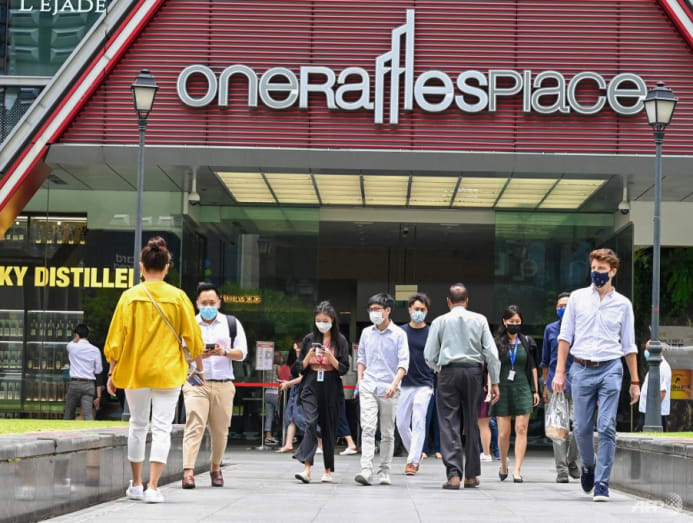IN FOCUS: When employees feel burned out and undervalued at work, how can they be persuaded to stay?
Ad
Singapore
IN FOCUS: When employees experience burned out and undervalued at work, how can they be persuaded to stay?
With more people thinking virtually making changes to their working lives after nearly two years of COVID-19, CNA looks at what employers can exercise to opposite what has been dubbed globally equally the Cracking Resignation.

Although employees get out for a multitude of reasons, some turnover issues are more hard to resolve than others. (Illustration: Rafa Estrada)
SINGAPORE: There was null that Lina's onetime employer could have done to persuade her to stay.
Feeling undervalued in her role as a chemist at a public healthcare institution and with COVID-19 making her reassess her life priorities, she decided it was time for a alter.
"I mainly left because I'd been thinking for a while that considering the piece of work is non ever easy, and people demand to be valued for the work that they do. I felt that the appreciation for the work that nosotros do is not really sufficient to deal with the stresses of daily work," she told CNA.
The COVID-19 pandemic made this situation worse, she added. While it was previously already difficult to take leave, it became "practically incommunicable" from the start of the "circuit breaker" period, said Lina, who asked for her real name not to be used.
"Somewhen the cons but started outweighing the pros."
Lina is office of a global tendency dubbed the Great Resignation, which is seeing growing numbers of employees make up one's mind to move on to new jobs. This often follows a period of reflection nigh what they desire out of life after nearly two years of living with the COVID-19 pandemic.
The trend overseas has been mostly attributed to employee burnout and wage freezes over the past two years. Many workers who delayed their resignations considering of the pandemic are leaving their jobs now every bit the state of affairs stabilises.
While labour market place numbers from the Ministry of Manpower (MOM) do not bear witness an increase in overall resignation rates, experts and recruiters confirmed that they are seeing signs that the trend is emerging in Singapore, with a spike across industries in people looking for something new.
The bodily data will "lag" and probably but reflect the trend from the first quarter of 2022, said Mr Adrian Tan, Hour expert and future of work strategist at the Found for Man Resources Professionals (IHRP).
Surveys also show that workers are likely to be seeking out a new opportunity soon. One by recruitment agency Robert Walters found that 52 per cent of respondents were looking to change jobs within the next half dozen months.
And there are pockets of data emerging that confirm the higher attrition rates. For example, about 1,500 healthcare workers resigned in the first half of 2021, compared to well-nigh 2,000 annually earlier the pandemic.
HOW Tin EMPLOYERS HANG ON TO STAFF?
With working life poised to render to some kind of normality every bit Singapore inches towards pre-pandemic norms, what will convince employees like Lina to stay in their jobs?
Although workers are leaving for the same reasons as before - better compensation, chore prospects or work-life residuum - the COVID-nineteen pandemic has accelerated attrition for many firms as individuals take stock of their priorities, experts said.
Many employees who leave during this period also cite that they feel undervalued or underappreciated, and resigned to observe more meaningful and purposeful work, they added. How companies supported their workers throughout the pandemic will also influence whether employees choose to stay.
"Companies need to determine who is leaving. Not all attrition is bad. There are functional turnovers and dysfunctional turnovers. If their poor-performing employees are leaving, then this type of turnover may be considered to be functional if companies are able to hire improve-performing ones," said Dr Sherwin Ignatius Chia, a senior lecturer with the S R Nathan School of Man Development at the Singapore University of Social Sciences (SUSS).
"However, if your height performers are leaving, and then this may exist dysfunctional peculiarly if you are losing your height talents to competitors and you are unable to go an equivalent or meliorate replacement."
Lina, who is in her belatedly 20s, stressed that she did non resign because of the stress from working as a healthcare worker during the pandemic.
"Information technology was but a build-up of feeling underappreciated for my work, not really related to the pandemic, like the amount of stress increased unimaginably. No, it'due south more of a general sense of underappreciation for the work that we do," she added.
The slew of pay increases and bonuses for healthcare workers rolled out by the Regime was not enough to brand Lina stay.
She first had thoughts of leaving the task about a yr ago, and spent months looking for a new opportunity that would allow her to have a "more sustainable" lifestyle. She said colleagues besides resigned for similar reasons.
Seeing her colleagues resign also prompted her to remember about her next move, she said. Since healthcare workers work mostly in teams, every resignation means a striking in terms of workload and team morale.
"When y'all encounter ii or iii of your friends leave, you suddenly re-evaluate the pros and cons of working there. Previously, yous were staying on because your friends were hither, simply if you leave you will lose the camaraderie. But now they are gone … what practice you have left?"
Lina took a significant pay cut to move to her current job - a similar office in a private healthcare arrangement.
"I was looking for an environment that values mental health. I wouldn't say prioritise, but rather (an environment that) looks subsequently the mental health of its employees. One that gives more personal space and time, in the sense of not being always on, and giving me the surroundings to piece of work in a sustainable way rather than burn yourself out from the chore," she added.

The reasons why employees leave vary by position level, noted Dr Wu Peichuan, deputy bookish director of the Masters programme in man majuscule management and analytics at the National University of Singapore (NUS) Business School.
"At the non-managerial level, employees are concerned about pay and benefits, growth opportunities, and underutilised skills," she told CNA.
"Centre direction tend to focus on growth opportunities, pay and benefits, and wellbeing, while those at the director or VP level cite growth opportunities, alter in leadership, and transparency in leadership communications."
While these are normal reasons for employees to quit, the pandemic has exacerbated the speed of employees leaving, since many companies have frozen pay increases and bonuses, besides as cut base pay and promotion opportunities during this period, said Dr Wu.
"And then the merely way to move upwards or earn more is to motility out," she added.
SOME Bug EASIER TO Prepare THAN OTHERS
It is never likewise tardily for companies to hold on to workers who may already exist looking for their next role, experts said.
While each employee is different, there are a few things most companies can do to retain workers, although some problems are more difficult to fix than others.
If the key bug are compensation and benefits or career progression, companies tin endeavor to retain the employee by trying to match their expectations, especially if they are high performers, said Dr Chia.
Counter offers are still "very common these days" for companies who want to endeavor to retain people even after they resign, said senior partner at recruitment agency Page Executive Jessy Wong.
With the cuts and reductions made in 2020, many companies recovered in 2021, and employers should be clear that workers would look a salary review, said Randstad manager for Singapore and Malaysia Jaya Dass.
"Companies can also start to discuss with the employee on the future career plans and when the plan volition be rolled out," said Dr Chia.
"Companies must ensure that this programme is executed, otherwise information technology volition exist a violation of a psychological contract."
LOOKING FOR A CAREER Change
But non all employees leave for compensation or career growth-related reasons.
For 26-year-former Gordon Chia, who resigned from his job in a public relations firm to pursue a career switch to software development, zilch could have made him stay in his previous role even though the civilisation at his firm was "pretty practiced", he told CNA.
"I decided that I did not like what I was doing. Basically, I lost the joy of doing PR, and I decided that I would rather practise something closer to my hobbies and passions, which were tech-related," said Mr Chia.
After realising that he wanted to move on to something new, he took a few days of exit to consider his options.
"I think one of the conclusions that I drew is that, realistically, I'm twenty-something. I'yard very likely going to live maybe 60 to 70 years more, and and then that's it. I idea to myself, do I desire to pursue a chore for money and simply work a lot, non be very happy with it, and so get some money so I tin can spend some money at the end of my life?
"Or do I want to detect a job that actually fulfills me? It doesn't need to pay that much, just if information technology fulfills me, won't my life exist a lot happier?"
Mr Chia'south ex-bosses were very supportive when he shared his reasons for his difference, which shocked him.
"When I told them I wanted to practice something else, all of them were like, 'Oh that's a surprise, but we really appreciate you telling us and we're very happy to run into where you're going next'," he said, calculation that he is still in contact with his former colleagues.
After resigning, Mr Chia went on to enroll in a three-calendar month intensive software engineering science course while non drawing a salary, and constitute a job every bit a software developer in an AI startup soon after.

Employees like Mr Chia and Lina, who resign in search of more than purposeful work or amend mental health and well-being are more than hard to retain, said SUSS' Dr Chia.
"It will be difficult if these reasons exist due to a misfit between the employee and the company either in terms of values or these reasons result in a lack of trust in managers and leaders or both," he added.
"These bug will non be addressed overnight as they likely existed for a long period of time and take get deeply ingrained in the culture."
To address the possibility of staff turnover, leaders and managers must admit these problems and be genuine in addressing them, said Dr Chia.
"Plans for modify must exist communicated and results must be shared regularly so that employees can see that the civilisation is changing for the amend. But this change is not easy and tin can have a while."
Is 2022 the twelvemonth when employees have back control over piece of work amidst predictions of a not bad resignation wave? Heed to CNA's Centre of the Thing:
EMPLOYEES DON'T WANT TO 'Become BACKWARDS'
As Singapore emerges from the pandemic, people are not prepared to "become backwards" to a life that was more stressful, said Randstad's Ms Dass.
This includes pre-pandemic issues like commute times, a lack of work flexibility and options for staff to work remotely, also every bit not having space for mental wellness, she added.
"If their employer cannot demonstrate they accept learned from the last two years and are prepared to make changes to piece of work and expectations and likewise have into account employee feedback, they are going to lose proficient talent to other organisations who have a better EVP (employee value suggestion) on their learning from COVID and how they have inverse," said Ms Dass.
Experts urged companies to be empathetic and willing to mind to employees in finding out what they are expecting to see postal service-pandemic.
"The level of empathy that we demand to show our employees needs to be a lot higher because everyone is perchance going through different, unique situations during the pandemic or as we are coming out of pandemic," said Page Executive'southward Ms Wong.
For instance, United states of america bank JP Morgan recently announced that it would provide U.s.a.$5,000 of quarantine reimbursement for a unmarried trip for Hong Kong staff to visit their loved ones within the next year.
"That, to me, is showing the level of empathy for people that are abroad from their family, that want to go and encounter their family. Sure information technology'south a benefit merely it is not then much of a bounty," said Ms Wong.
"If you're saying that I'grand increasing US$5,000 to your pay, for some people it is insignificant.
"However… if the visitor says that we'll pay for your quarantine, even though it's the aforementioned amount, the significant behind this gesture, the meaning behind this benefit will exist perceived very differently because the visitor is understanding the hardship or difficulties of somebody who'south away from their family."

Companies should be proactive to bank check in with employees regularly, and accept transparent discussions about areas similar progression and job satisfaction, said Mr Monty Sujanani, country manager for Robert Walters Singapore
"Companies can also deep-dive into what their talent value most, and focus on addressing them and communicating them more clearly," he added.
Feedback surveys tin can aid companies ensure that they are in touch with what their staff needs with the "ebb and period" of the pandemic, said Ms Dass.
"Companies need to take authentic deportment to accost employee feel-related challenges, with the leaders leading the manner. The well-nigh pressing consequence encountered past companies is whether their employees should return to the office to work when they can resume their tasks in the function setting," said NUS' Dr Wu.
"When the time comes, would companies provide chances or options for their employees? Who should exist consulted regarding flexibility in work-life decisions? Some other pressing issue is how to go along to support employees in the areas of well-being in a fair and respectable manner."
As companies move to stem the possible outflow of employees, experts were dissever on whether compunction rates would continue to climb after this surge passes, cementing the trend of lower job loyalty.
The trend will finish depending on how companies address existing turnover issues, said Dr Wu.
"I recall this is a coexisting trend. It'southward this release from the tension of the last 2 years that many feel they need to do something significant to shake off that feeling of loss of freedom and besides the need to shake off the stress of this pandemic," said Ms Dass.
However, if the pandemic is here to stay and a sense of normalcy and control is yet out of reach for the next few years, this will exist a persistent trend as more people will make changes in their lives to continue to cope, she added.
Similarly, IHRP'southward Mr Tan expects the surge in resignations to subside when things have "somewhat normalised".
When travelling returns to normal, workers will spend more than of their savings on that, limiting their ability to tender their resignation at short notice, he added.
Beyond resignations triggered past the pandemic, Assoc Prof Trevor Yu of the Nanyang Business Schoolhouse at Nanyang Technological University expects the full general tendency of reduced commitment and chore loyalty to continue.
"Societal attitudes towards task-hopping and loyalty have been on the decline for decades. There are also more alternative forms of employment outside of the usual full-time employment model which tends to be more long-term," he added.
This gives people the autonomy and flexibility to move freely betwixt jobs based more on their personal interests, values and ambition, said Assoc Prof Yu.
For workers who observe themselves increasingly compelled to look for other opportunities that meliorate suit them, Mr Chia urged those who no longer discover fulfillment in their current jobs to take the leap.
"Just move. If you really find a task that you like, merely take information technology. I believe that if you are passionate plenty for that role, you volition automatically just propel yourself into the role. You'll grow into it a lot amend than you are at your current chore."


0 Response to "IN FOCUS: When employees feel burned out and undervalued at work, how can they be persuaded to stay?"
Post a Comment